For the 2025 school year, there are 2 public elementary schools serving 713 students in Lakeland School District. This district's average elementary testing ranking is 6/10, which is in the top 50% of public elementary schools in Pennsylvania.
Public Elementary Schools in Lakeland School District have an average math proficiency score of 47% (versus the Pennsylvania public elementary school average of 35%), and reading proficiency score of 51% (versus the 54% statewide average).
Minority enrollment is 11% of the student body (majority Hispanic), which is less than the Pennsylvania public elementary school average of 42% (majority Hispanic and Black).
Overview
This School District
This State (PA)
# Schools
3 Schools
2,145 Schools
# Students
1,353 Students
1,108,977 Students
# Teachers
102 Teachers
82,943 Teachers
Student : Teacher Ratio
13:1
13:1
District Rank
Lakeland School District, which is ranked within the top 50% of all 675 school districts in Pennsylvania (based off of combined math and reading proficiency testing data) for the 2021-2022 school year.
The school district's graduation rate of 90-94% has stayed relatively flat over five school years.
Overall District Rank
#228 out of 684 school districts
(Top 50%)
(Top 50%)
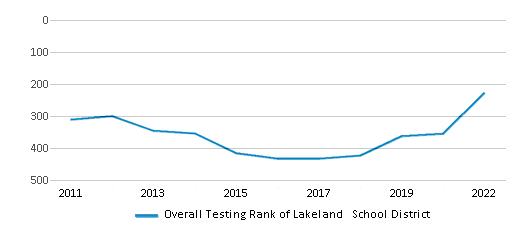
Math Test Scores (% Proficient)
43%
36%
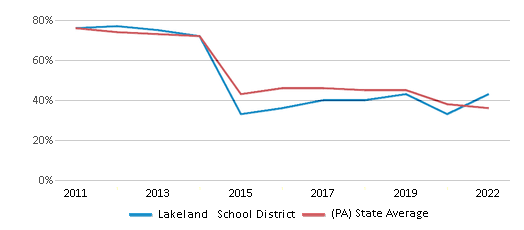
Reading/Language Arts Test Scores (% Proficient)
58%
55%
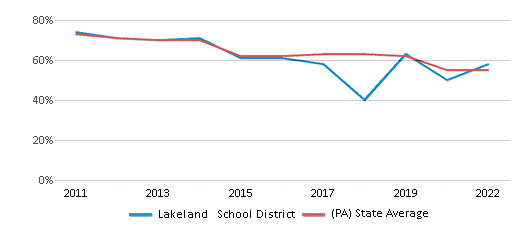
Science Test Scores (% Proficient)
60%
57%
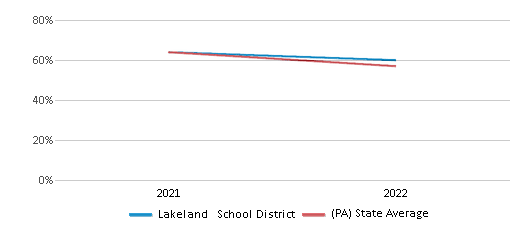
Graduation Rate
90-94%
87%
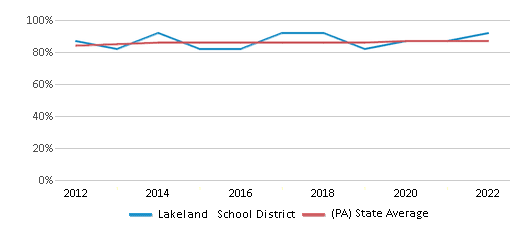
Students by Ethnicity:
Diversity Score
0.18
0.61
# American Indian Students
n/a
2,278 Students
% American Indian Students
n/a
n/a
# Asian Students
5 Students
51,838 Students
% Asian Students
1%
5%
# Hispanic Students
69 Students
173,776 Students
% Hispanic Students
5%
16%
# Black Students
26 Students
169,696 Students
% Black Students
2%
15%
# White Students
1,222 Students
645,871 Students
% White Students
90%
58%
# Hawaiian Students
n/a
965 Students
% Hawaiian Students
n/a
n/a
# Two or more races Students
31 Students
63,991 Students
% of Two or more races Students
2%
6%
Students by Grade:
# Students in PK Grade:
-
7,744
# Students in K Grade:
98
110,287
# Students in 1st Grade:
98
120,767
# Students in 2nd Grade:
108
126,133
# Students in 3rd Grade:
105
120,907
# Students in 4th Grade:
111
125,574
# Students in 5th Grade:
90
126,000
# Students in 6th Grade:
103
126,698
# Students in 7th Grade:
99
94,854
# Students in 8th Grade:
106
93,972
# Students in 9th Grade:
106
16,255
# Students in 10th Grade:
111
14,467
# Students in 11th Grade:
105
12,872
# Students in 12th Grade:
113
12,447
# Ungraded Students:
-
-
District Revenue and Spending
The revenue/student of $18,745 in this school district is less than the state median of $23,696. The school district revenue/student has stayed relatively flat over four school years.
The school district's spending/student of $17,530 is less than the state median of $23,119. The school district spending/student has stayed relatively flat over four school years.
Total Revenue
$25 MM
$39,541 MM
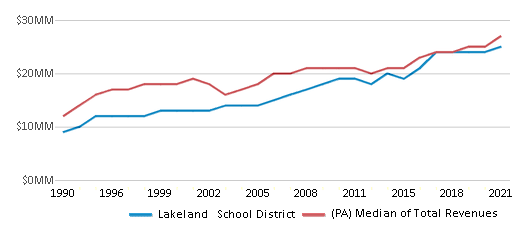
Spending
$24 MM
$38,578 MM
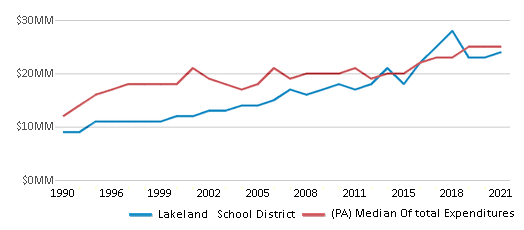
Revenue / Student
$18,745
$23,696
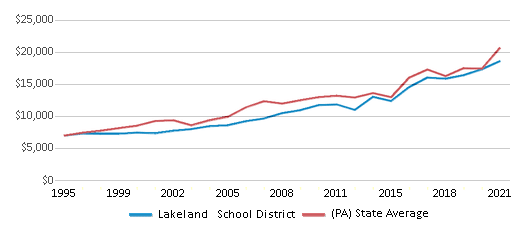
Spending / Student
$17,530
$23,119
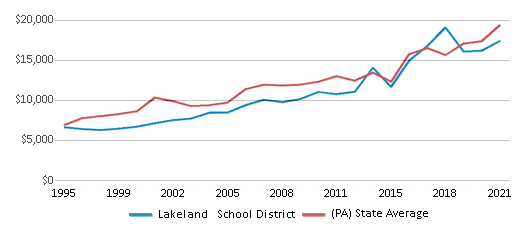
Best Lakeland School District Public Elementary Schools (2025)
School
(Math and Reading Proficiency)
(Math and Reading Proficiency)
Location
Grades
Students
Rank: #11.
Lakeland El Sch - Scott Campus
(Math: 53% | Reading: 60%)
Rank:
Rank:
7/
Top 50%10
1333 Lakeland Dr
Jermyn, PA 18433
(570) 254-9485
Jermyn, PA 18433
(570) 254-9485
Grades: K-6
| 439 students
Rank: #22.
Lakeland El Sch - Mayfield Campus
(Math: 35-39% | Reading: 35-39%)
Rank:
Rank:
3/
Bottom 50%10
501 Linden St
Jermyn, PA 18433
(570) 254-9485
Jermyn, PA 18433
(570) 254-9485
Grades: K-6
| 274 students
Recent Articles

Year-Round Or Traditional Schedule?
Which is more appropriate for your child? A year-round attendance schedule or traditional schedule? We look at the pros and cons.

Why You Should Encourage Your Child to Join a Sports Team
Participating in team sports has a great many benefits for children, there is no doubt. In this article you will learn what those benefits are.

White Students are Now the Minority in U.S. Public Schools
Increasing birth rates among immigrant families from Asia and Central and South America, combined with lower birth rates among white families, means that for the first time in history, public school students in the United States are majority-minority. This shift in demographics poses difficulties for schools as they work to accommodate children of varying language abilities and socio-economic backgrounds.





